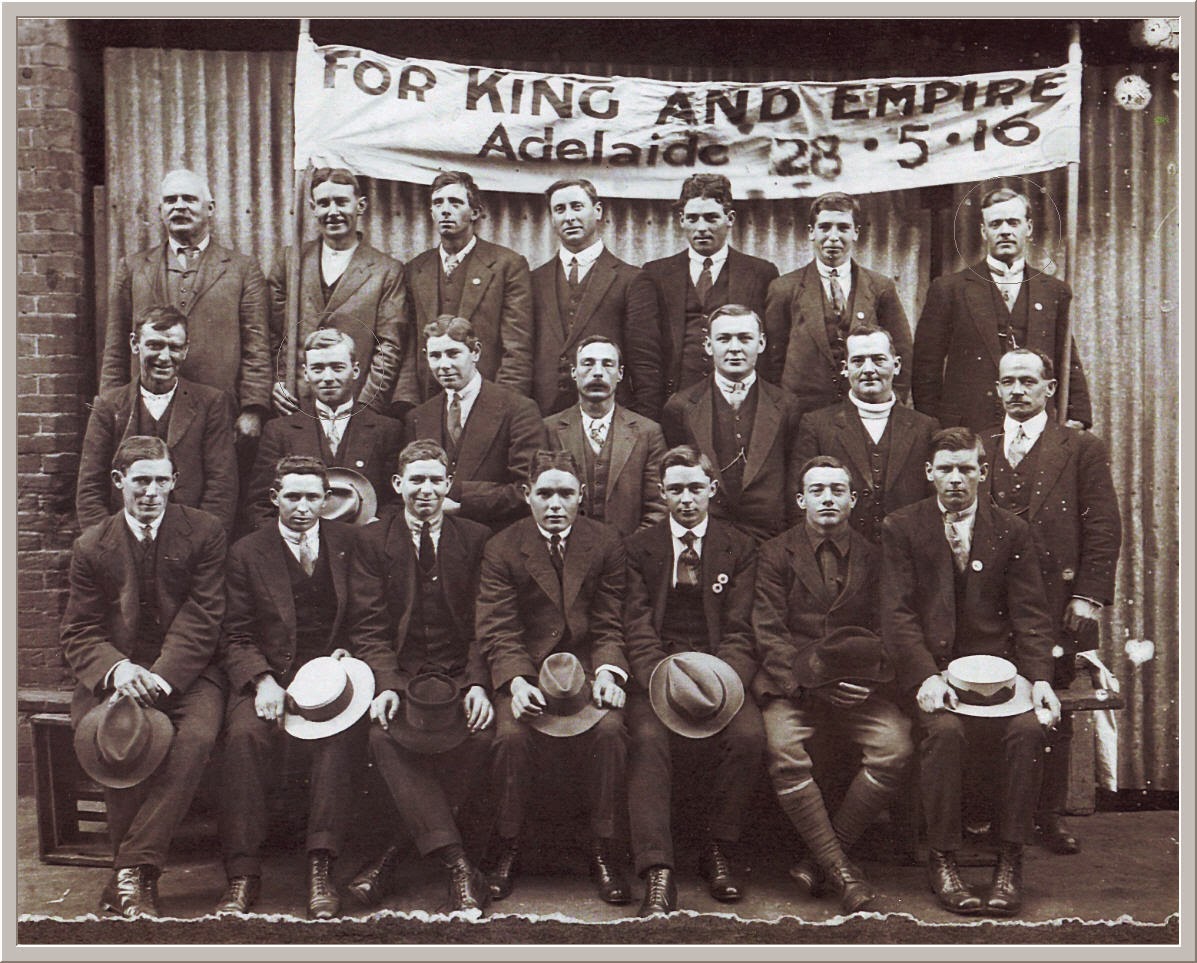Walter Phillip Fradd was born on the 17th of February 1891 in Burra, South Australia, the second son of William Phillip and Hannah Tasker Fradd (nee Warner).
Melville Wesley Fradd was born on the 06th May
1894 in Minburra, South Australia
Melville and his brother Walter enlisted together on the
23rd May 1916 in Adelaide.
About 2 weeks after enlisting Melville was admitted to the
camp hospital at Wayville with a fever.
On the 12th June he was transferred to Keswick Military
Hospital, but his condition continued to deteriorate and on the 21st June he
was admitted to the Infectious Diseases Hospital in North Adelaide, where he died
on the 25th June 1916 from measles and bronchial pneumonia. Two other recruits
died of meningitis on the same day.
Private Melville Fradd was buried at West Terrace Cemetery,
Adelaide in Road 5, Row 5E Grave 52.
Because he died before the A.I.F. section was established,
Melville's grave is in the general section of the cemetery. His family erected
a headstone which had deteriorated with time. A small plaque with Melville’s
military details has been placed at the foot of the grave.
His mother Hannah received a pension of 20 shillings a
fortnight from the 26th June 1916.
"He left his home in health and
strength
To answer his country’s call;
He gave his life, he gave his best
For you for me for all;
On Australia’s Roll Of Honour
You'll find our dear boy's name"
Memorian notice for Melville Fradd placed
by his parents
The Chronicle 30 June 1917
Melville is commemorated on the:
1. Australian War Memorial, Canberra, panel 186
2. South Australian National War Memorial, Adelaide
3. Honour Board in the Laura Civic Centre
There is some mystery as to the
criteria used to select whose names would be commemorated on the Laura War
Memorial. His name was not included presumably because he did not serve
overseas. It is worth noting that the nearby Caltowie community chose to
include on their memorial, a man who also died while training in Adelaide.
Honouring Soldiers
Beetaloo Valley, August
1st
Last
night nearly all the residents of the neighbourhood assembled at the house of
Mr. Fradd to bid farewell to Private Walter Fradd. Another of Mr. Fradds sons
that joined the colours with Walter, recently died in camp (Melville)
Speeches
were made by Messer’s A. Jacobi, P. Curtin and J.Murphy and the guest presented
with a wristlet watch and trench candlestick. The visitors also requested the
parents to accept a beautiful wreath to be placed upon the grave of their late
son.
The Advertiser, 04 August 1916
The Nominal Roll listed Walter in the 10th Infantry Battalion, 20th Reinforcements when he sailed aboard HMAT Anchises from Adelaide on 28 August 1916 to go and fight in The Great War.
The Advertiser, 04 August 1916
The Nominal Roll listed Walter in the 10th Infantry Battalion, 20th Reinforcements when he sailed aboard HMAT Anchises from Adelaide on 28 August 1916 to go and fight in The Great War.
From
Australia, his trip took a little under a month arriving at Plymouth, England
before transferring to Folkestone; also in England, on the 11th of November
1916 where he stayed for close to 2 months before shipping out to France and
the Western front.
Walter was severely wounded with
a gunshot wound/s to the abdomen; his record mentions that he
also received wounds to the mouth and shoulder at the same time. This was
possibly from machinegun fire that strafed the fields to hinder Allied advance
as the Germans began their planned retreat.
Walter lay out in the battlefield for a long time and apparently there were badly wounded people all around him many of whom were screaming from pain. He found the noise almost unbearable and when the stretcher bearers came, he urged them to take those people first just so the noise would stop.
Walter lay out in the battlefield for a long time and apparently there were badly wounded people all around him many of whom were screaming from pain. He found the noise almost unbearable and when the stretcher bearers came, he urged them to take those people first just so the noise would stop.
When
Walter was finally taken back to the first aid post someone moved down the
ranks of the wounded assessing their condition and attaching some sort of
marker (I’m not sure what - a piece of paper or coloured cloth perhaps) which
gave guidance as to their chances of survival. Walter was apparently
"tagged" as "won't live until morning" and as a result
wasn't given any treatment.
Obviously
when he was still alive in the morning treatment was begun!
Wallis, a
mate from nearby Laura, South Australia went to see him in the clearing station
and stated that Walter was laying on one stretcher and his insides were laying
on the stretcher next to him.
Walter
was evacuated aboard the hospital ship HMHS Gloucester Castle.Incidentally, this ship was torpedoed by the German U-boat UB-32 off the Isle of Wight a few weeks later on 31 March 1917.
Surely a lucky man, he survived not only the assault on Malt Trench but also avoided this sinking to eventually return to Australia in late August 1917.
Surely a lucky man, he survived not only the assault on Malt Trench but also avoided this sinking to eventually return to Australia in late August 1917.
Melville [left ] Walter [ right ] – circled
For King And Empire… Lest We Forget



